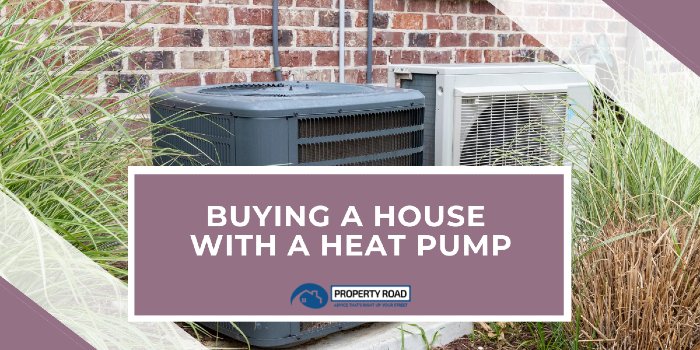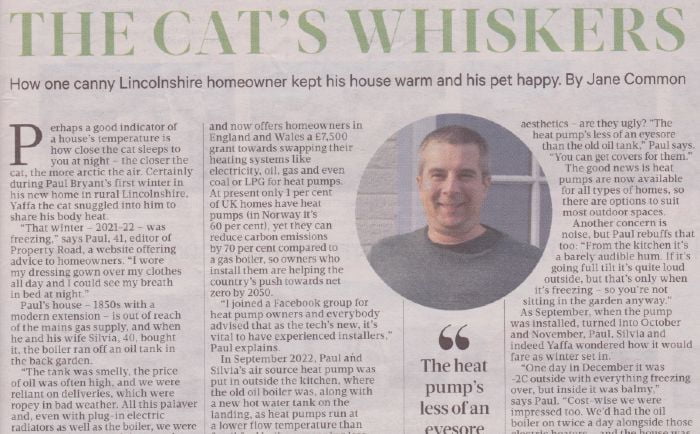If you’re thinking of buying a house with a heat pump already installed, then it is important to know about the different types available in the UK.
Since our energy bills are high and likely to go higher in the years to come, more people are looking at various ways to reduce energy consumption with insulation and heat pumps.
And with domestic gas boilers being banned for new-build homes from 2025, heat pumps will become increasingly popular.
They are already growing in popularity, thanks mainly to Government subsidies, as they can be a very cost-effective and carbon-neutral way to keep your home warm.
But what are they? How do heat pumps work, and which is best?
Here, the Property Road team takes a closer look at buying a house with a heat pump in the UK.
The main types of heat pumps found in the UK
There are three main types of heat pumps found in the UK – they are air-source, ground-source, and water-source. Each has its own advantages and disadvantages, so if the house you want to buy has one fitted, you need to know which one it is and why it offers the best energy solution for you.
Air-source
Air-source heat pumps are the most common type of heat pump in the UK. They take energy from the air outside to generate heating, making them an efficient and cost-effective option.
These are also a good choice if you are looking for a relatively carbon-neutral and cost-effective way to heat your home.
They are also relatively easy to install and maintain, making them an attractive option for many homeowners.
Air-source pumps can be cheaper to run than other types of heating systems (when installed correctly).
In addition, they can often be installed with smaller or no upfront costs when compared to ground-source or water-source systems. However, they may not be as efficient.
Ground-source
Ground source heat pumps use energy from the ground by drilling boreholes into the earth to extract energy. This type of system is more efficient and can produce more heat than air-source pumps, making it a great choice if you want to reduce your energy bills.
However, they are usually more expensive to install as they require drilling rigs and expertise.
A ground-source heat pump can be an excellent choice for those looking for a more efficient and cost-effective way to heat their home.
As they use energy from the ground, they are also more environmentally friendly than air-source systems and can be cheaper to run as they are more efficient and require less energy. However, the initial cost of installation can be higher than other types of heating systems.
Water-source
Water-source heat pumps use energy from a nearby water source (such as a lake or river) to generate heating for your home.
These systems are usually more efficient than air-source and ground-source systems, making them a great choice for those looking for an energy-efficient heating system. However, they can be expensive to install and require specialist knowledge and equipment.
They are also an environmentally friendly option, as they use energy from a renewable source.
These pumps can be cheaper to run than other types of heating systems due to their high efficiency. However, the initial cost of installation can be higher than other types of heat pumps.
Buying A Property? FREE Step-By-Step Platform
The impact on heating bills and property value
As we have seen, heat pumps can have a positive impact on your heating bills but also on property values.
Since heat pumps are more efficient than traditional heating systems, they can help to reduce your energy costs.
This, in turn, can also lead to an increase in the value of your property, as buyers will be attracted by the lower running costs associated with a heat pump system.
As a buyer, you’ll need to be aware that a house with a heat pump is probably on sale at a premium because of the potential savings and its green credentials.
Our Founder’s Experience
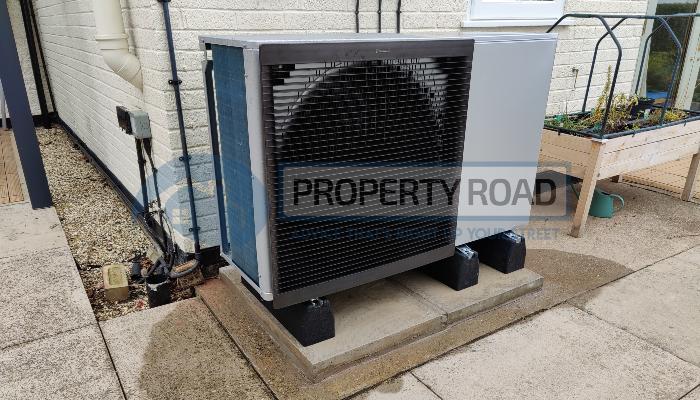
While we didn’t buy a property with a heat pump already installed, we did switch from an oil boiler to an air-source heat pump after a year at our current property.
Our main motivation wasn’t to save money (if we do, that’s a bonus). Instead, the benefits we focused on included:
- A more predictable, secure price compared to heating oil (which fluctuates daily);
- No more relying on oil deliveries and worrying about whether they’ll turn up;
- No more smell, unsightly oil tank taking up space in our garden;
- The ability to have a consistent, stable indoor temperature all year round (without it costing a fortune);
- Reducing our carbon footprint by moving away from fossil fuels to more renewable electricity.
Obviously, if it saved money too, that would be a bonus.
For the installation, we decided to use a local company that had lots of positive reviews and had also certified Heat Geek engineers. This ensured we were getting a highly qualified installer though there are countless other good installers who aren’t on Heat Geek too.
We had to have several of our radiators replaced in order to accommodate the lower flow temperatures heat pumps run at. To save space, we had a few ‘fan-assisted radiators’ installed where triple panel ones would have otherwise been required.
Fan-assisted radiators are great, but we did have to disable the water temperature sensor in them to ensure they remained ‘always on’ to get the best from them.
Running modes matter!
From day one, we’ve run our 11kw Daikin heat pump on weather compensation mode. With this, you don’t rely on thermostats inside at all. You just set a designed curve (the installer should do this initially) that says at X temperature outside, run a water temperature of Y.
The heat pump then automatically adjusts the water temperature depending on how cold it is outside to give you the perfect indoor temperature. You might have to play with the settings a little, but it’s considered to be the best and most efficient way to run a heat pump.
We’ve not yet had our heat pump a full year, but at the time of writing, it’s -2 outside, and we are perfectly warm inside. Running costs are quite high when it’s this cold, but they do even out when the weather gets a bit milder.
Are we saving money?
Currently, it looks like our heat pump will cost us around the same as our oil boiler. However, we are heating our house 24/7 to be warm all the time, which we didn’t do with oil. Plus, no more oil deliveries or a smelly oil tank.
Once we factor in our solar panels, I expect we’ll find we have saved money over oil. Plus, there’s more we can do as we are still learning the best way to run our heat pump. That’s the thing with heat pumps, there is a learning curve to get the best from them, but it’s worth it – we don’t regret ours one little bit!
In fact, our story actually became a feature in The Sunday Times, you can read the online version here.
Some tips when buying a house with a heat pump
1) Check installation quality
Priority number one should be to make sure the heat pump was designed and installed correctly. Ask to see the heat loss calculations that were done before the installation, and ask for recent electricity bills and details of how the current owners use the heat pump (e.g., how often the heating is on and what their target temperature is).
Badly designed systems can significantly increase your running costs and can be costly to rectify, so it’s important to satisfy yourself it’s been done correctly.
2) Check servicing records
If the heat pump has been looked after, it should have been serviced every year, and the seller should have records of this. It may also help you see if there have been any issues over the years.
3) Learn how to use a heat pump
If the seller has perfected the setup, you might not have to touch it at all. But, as we all have different lifestyles and preferences, you’ll probably find you’ll need to do at least some tweaking to get the perfect setup for you.
Take the time to learn how heat pumps work, and be prepared to forget some of what you know about running other types of heating. Heat pumps work entirely differently!
Are heat pumps expensive to install?
Another factor when buying a house with a heat already installed is to appreciate that the pumps are expensive to fit.
The cost depends on the pump system chosen, but having one does boost a property’s value.
Usually, air-source systems tend to be cheaper than ground-source or water-source systems but may not be as efficient.
Ground-source systems usually require more specialist knowledge and equipment, making them more expensive to install. Water-source systems are usually more efficient than air-source or ground-source systems but still require specialist installation knowledge and can be costly.
Other questions that you’ll need to consider include:
How long does a heat pump last?
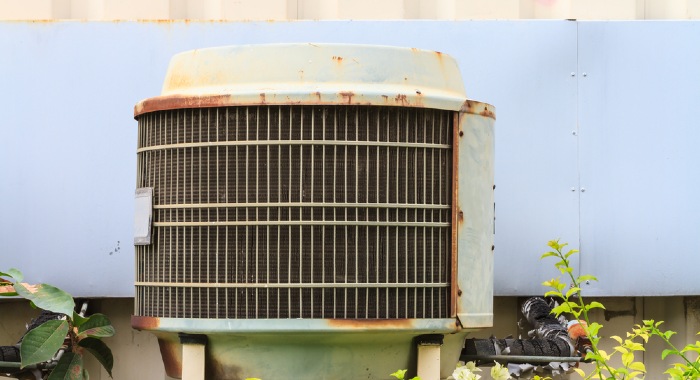
The next most important question, after cost, is how long does a heat pump last? Heat pumps typically have a lifespan of around 15-20 years, depending on how well they are maintained. They also require regular servicing and maintenance – that’s a cost to you when you buy the house – to ensure they are running efficiently and to extend their lifespan.
How much do heat pumps in the UK cost to maintain?
The next most important question is asking how much heat pumps cost to maintain. A lot will depend on the type of system you have installed and how regularly it is serviced – which should be done every year. Check the manufacturer’s instructions. An average annual cost for maintenance is between £100-£300, though it can be less if you do some of the regular maintenance yourself.
What a house seller needs to provide if their home has a heat pump
If a house seller in the UK has a heat pump installed, they must provide certain documents to prospective buyers. This includes:
- The manufacturer’s instructions;
- Any warranty paperwork for the system;
- Details of when the system was last serviced and maintained;
- Any relevant energy efficiency certificates;
- A certificate of compliance (see below).
Having all the necessary paperwork on hand will help reassure you, as the buyer, that the heat pump system is in good working order and will run efficiently for years to come.
Do heat pumps need to meet building regs?
Heat pumps need to be approved by local building regulations before they can be installed.
This is done to ensure that all systems are safe and meet energy efficiency requirements.
The homeowner should have a certificate of compliance once the system has been installed, as this will need to be provided to any prospective buyers. The certificate is provided by the installer.
Ideally, the installer will be MCS certified, as this will provide a certain level of protection to you as the new owner. It also means the seller should have a full MCS handover pack with all design details, warranties, and guarantees.
Do not buy a house that cannot prove that its heat pump meets building regulations.
How do heat pumps compare to traditional heating systems
Heat pumps can be a great alternative to traditional heating systems as they can be more energy-efficient and cost-effective in the long run.
However, they do need to be installed correctly. There are many horror stories about badly installed systems that cost the owners more to run than their previous heating method.
Ensuring the current owner has not had any issues and can satisfactorily heat their home without it costing a fortune is key.
However, if you do buy a house with a heat pump that has been installed correctly, you can potentially benefit from reduced energy bills compared to other heating methods.
You can also be happy in the knowledge you are not relying on fossil fuels and that the electricity you use can be generated from renewable sources.
Are heat pumps eligible for RHI payments?

Heat pumps are eligible for the UK’s Renewable Heat Incentive (RHI) payments.
This is a government-funded scheme that provides financial incentives to homeowners who install renewable energy systems in their homes.
However, the scheme closed to new applications on 31st March 2022. Therefore, heat pumps installed after this date may not be eligible for RHI payments.
If the heat pump was installed with RHI being applicable, the amount of money you can receive will depend on the type and size of your heat pump system but could be up to £2,800 per year.
However, heat pumps are only eligible for payments for seven years after installation. Again, ask the seller about when the pump was installed and ensure the payments can be transferred to you as the new owner.
If the heat pump was installed under the BUS (Boiler Upgrade Scheme), the owner may have received a payment of £5,000 towards the cost of their installation. However, as this is a one-off payment that usually goes directly to the installer, you will not be eligible for any payments if you buy the property.
Why do heat pumps operate differently from normal boilers, and how they work best
Heat pumps operate differently from normal boilers because they use ambient air, ground, or water sources to generate heat.
This means that rather than burning fuel to create heat, a heat pump will extract energy from the environment and use it for heating purposes.
Heat pumps are most efficient when operating at lower temperatures, so using them with underfloor heating or radiators means setting them to a lower temperature to help to maximise efficiency.
Also, heat pumps should be used in combination with good insulation and draught-proofing to make the most of their energy-saving capabilities.
Does a homeowner need to rethink how they use heat pumps?
Heat pumps work quite differently from most other forms of heating in that they work best when running at a low temperature for long periods of time.
Whereas most people with gas, oil, or other forms of heating may find that using a thermostat to turn the heating on and off as you need it works best, most people (especially if you’re at home a lot) will find their heat pump is more efficient if left on 24/7 (at least over winter).
This can take a bit of getting used to, as it feels wrong to heat the house when it’s not in use. However, because heat pumps run at low temperatures to maximise efficiencies, it takes them a long time to heat a property.
As it usually costs less to maintain a set level of heat rather than get a house up to temperature from cold, a constant heat tends to work best.
For this, most heat pumps run best on weather compensation mode. This is where the water temperature is dictated by the outside temperature. That means you never heat the water warmer than it needs to be to get the desired indoor temperature – no matter what the weather outside is doing!
After buying the house, you should take time to familiarise yourself with how heat pumps work and how best to use them will help you get the most out of your investment.
Will having a heat pump increase conveyancing costs when buying a house?
Usually, buying a home with a heat pump should not add a significant amount to the cost of conveyancing, as it does not require structural alterations or additional wiring.
However, it may be necessary for a solicitor to check that the heat pump has been installed to industry standards and is safe for use.
This can add a small amount to the cost, but it is important that this check is performed to ensure your safety.
Do owners need to consider annual heat pump servicing?
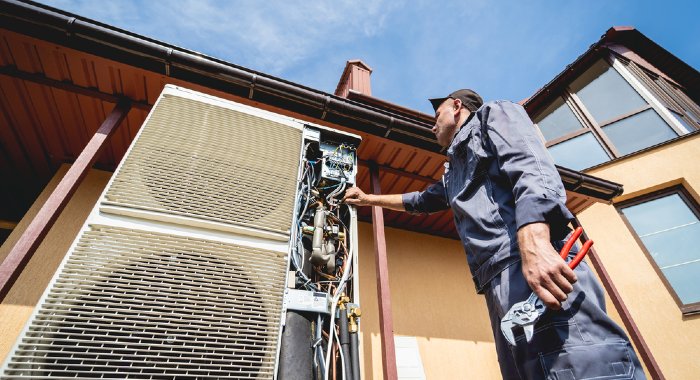
It is important to consider annual servicing for your heat pump system to ensure that it runs efficiently and safely. This will:
- Help reduce running costs and potential breakdowns.
- Help to identify any underlying problems before they become more serious, potentially saving you money in the long run.
When scheduling annual servicing, it is important to ensure that the engineer performing the work has experience with heat pump systems.
They should be able to check that all components are functioning correctly, as well as carry out any necessary maintenance or repairs.
Also, they should be able to advise you on how best to use your system to maximise efficiency.
What else do I need to know?
When buying a house with a heat pump system, there are several factors that should be taken into consideration to ensure you get the most out of your investment.
System efficiency is measured in the Coefficient of Performance (COP), which refers to the amount of energy used to generate the heating output.
A higher COP means better efficiency and more energy savings.
The initial cost of installation for an air-source heat pump can vary depending on the size and type of system you choose.
It is important to consider this when making your decision when buying because you will naturally want to enjoy long-term energy savings.
Don’t forget, too, that heat pumps will need servicing every year to keep them running at their optimal efficiency.
Buying a house with a heat pump
Essentially, each type of heat pump has its own advantages and disadvantages, and if you are buying a house that has one fitted, it should be able to meet your needs.
It’s worth appreciating that since the heat pump has already been installed, the initial cost was paid by the previous owner, and you will reap the energy bill savings.
That’s good news because heat pumps aren’t cheap to install, but they can be effective at lowering bills once they have been fitted (providing the system has been designed and installed correctly!).
Essentially, heat pumps are a great choice if you are looking for a relatively energy-efficient and carbon-neutral way to heat your home, and for many potential buyers, they are an attractive incentive in a world of ever-growing energy bills.

